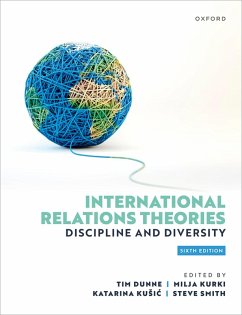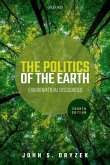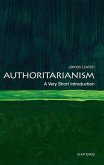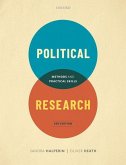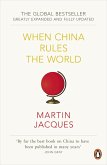Tim Dunne (Provost & Provost Senior Vice-President & Senior Vice-P, Milja Kurki (Professor and E.H. Carr Chair in International Politic, Katarina Kusic ( Marie Sklodowska Curie Action Postdoctoral Fellow
International Relations Theories
Discipline and Diversity
Tim Dunne (Provost & Provost Senior Vice-President & Senior Vice-P, Milja Kurki (Professor and E.H. Carr Chair in International Politic, Katarina Kusic ( Marie Sklodowska Curie Action Postdoctoral Fellow
International Relations Theories
Discipline and Diversity
- Broschiertes Buch
- Merkliste
- Auf die Merkliste
- Bewerten Bewerten
- Teilen
- Produkt teilen
- Produkterinnerung
- Produkterinnerung
With unrivalled coverage of IR theories from leading experts, from liberalism to postcolonialism. Reorganised to reflect the importance of global IR and newly authored chapters on classical realism, liberalism, Marxism, and critical theories. Case studies show readers how theory can be applied to address concrete political problems.
Andere Kunden interessierten sich auch für
![The Politics of the Earth The Politics of the Earth]() John S. Dryzek (Professor of Political Science at the Centre for DeThe Politics of the Earth36,99 €
John S. Dryzek (Professor of Political Science at the Centre for DeThe Politics of the Earth36,99 €![Authoritarianism Authoritarianism]() James Loxton (Department of Gover Lecturer in Comparative PoliticsAuthoritarianism9,49 €
James Loxton (Department of Gover Lecturer in Comparative PoliticsAuthoritarianism9,49 €![Political Research: Methods and Practical Skills Political Research: Methods and Practical Skills]() Sandra Halperin (Professor of Professor of International RelationsPolitical Research: Methods and Practical Skills46,99 €
Sandra Halperin (Professor of Professor of International RelationsPolitical Research: Methods and Practical Skills46,99 €![Frames of War Frames of War]() Judith ButlerFrames of War11,90 €
Judith ButlerFrames of War11,90 €![When China Rules the World When China Rules the World]() Martin JacquesWhen China Rules the World15,99 €
Martin JacquesWhen China Rules the World15,99 €![The Secret History of the American Empire The Secret History of the American Empire]() John PerkinsThe Secret History of the American Empire13,99 €
John PerkinsThe Secret History of the American Empire13,99 €![Adriatic Adriatic]() Robert D. KaplanAdriatic12,99 €
Robert D. KaplanAdriatic12,99 €-
-
-
With unrivalled coverage of IR theories from leading experts, from liberalism to postcolonialism. Reorganised to reflect the importance of global IR and newly authored chapters on classical realism, liberalism, Marxism, and critical theories. Case studies show readers how theory can be applied to address concrete political problems.
Hinweis: Dieser Artikel kann nur an eine deutsche Lieferadresse ausgeliefert werden.
Hinweis: Dieser Artikel kann nur an eine deutsche Lieferadresse ausgeliefert werden.
Produktdetails
- Produktdetails
- Verlag: Oxford University Press
- 6 Revised edition
- Seitenzahl: 440
- Erscheinungstermin: 25. Juni 2024
- Englisch
- Abmessung: 242mm x 187mm x 20mm
- Gewicht: 840g
- ISBN-13: 9780192866455
- ISBN-10: 0192866451
- Artikelnr.: 69522975
- Herstellerkennzeichnung
- Libri GmbH
- Europaallee 1
- 36244 Bad Hersfeld
- gpsr@libri.de
- Verlag: Oxford University Press
- 6 Revised edition
- Seitenzahl: 440
- Erscheinungstermin: 25. Juni 2024
- Englisch
- Abmessung: 242mm x 187mm x 20mm
- Gewicht: 840g
- ISBN-13: 9780192866455
- ISBN-10: 0192866451
- Artikelnr.: 69522975
- Herstellerkennzeichnung
- Libri GmbH
- Europaallee 1
- 36244 Bad Hersfeld
- gpsr@libri.de
Professor Tim Dunne is Provost & Senior Vice-President at the University of Surrey. Prior to his move to Surrey, Tim had a number of leadership roles at The University of Queensland (UQ), including Director of the Asia-Pacific Centre for R2P and Executive Dean of Humanities and Social Sciences. He is recognised for his research on human rights protection and foreign policy-making in a changing world order. He has written and co-edited fourteen books, including Terror in our Time (2012), The Globalization of International Society (2017), and a new revised edition of Diplomatic Investigations: Essays on the Theory of International Politics, edited by Herbert Butterfield and Martin Wight (2019) The Rise of the International (2023 in press. Tim is an elected Fellow of the Academic of Social Sciences, Australia; the Queensland Academic of Arts and Sciences; and holds an Emeritus Professorship at The University of Queensland. Professor Milja Kurki is E.H. Carr Chair in International Politics at Aberystwyth University. Her areas of interest are international relations theory, philosophy of science, democracy and democracy promotion, critical theory and more recently scientific cosmology, social-natural science nexus and multispecies politics. Her PhD was focused on the analysis of the meaning of causality in IR scholarship. She then led a major ERC project on the conceptual foundations of democracy promotion practices between 2008 and 2012, a project which involved extensive policy engagement. Dr Katarina Kui¿ is a Marie-Sk¿odowska Curie Actions Postdoctoral Fellow at the University of Vienna. Her research interests include statebuilding and peacebuilding interventions, land politics, interpretive and fieldwork-based methodologies, and post-colonial and decolonial thought. Her current work explores international political ecologies of land and human-nature relations more broadly. Her PhD and the ensuing monograph provided a conceptual critique of intervention through an ethnographic study of post-war reconstruction efforts in South East Europe. Katarina received her MA from Central European University and holds a PhD in International Politics from Aberystwyth University. Professor Sir Steve Smith is the U.K. Government International Education Champion and Prime Minister's Special Representative to Saudi Arabia for Education. He has been Vice-Chancellor and Chief Executive of the University of Exeter from 2002 to 2020. He was previously Senior Pro Vice-Chancellor (Academic Affairs) and Professor of International Politics at the University of Wales, Aberystwyth, as well as Head of the Department of International Politics, and Director of the Centre for Public Choice Studies at the University of East Anglia. Sir Steve is a graduate of the University of Southampton and holds a BSc in Politics and International Studies, an MSc in International Studies and a PhD in International Relations. He has written or edited 17 books, published well over 100 academic papers and has given over 170 academic presentations in 22 countries. Sir Steve was knighted in the 2011 Queen's Birthday Honours for services to higher education locally and nationally.
* 1: Steve Smith: Introduction: Diversity and Disciplinarity in
International Relations Theory
* 2: Amitav Acharya: Global International Relations
* 3: Milja Kurki and Colin Wight: International Relations and Social
Science
* 4: Michael C. Williams: Classical Realism
* 5: John J. Mearsheimer: Structural Realism
* 6: Knud Erik Jørgensen: Liberalism
* 7: Jennifer Sterling-Folker: Neoliberalism
* 8: Tim Dunne: The English School
* 9: Alexander Anievas: Marxism
* 10: Katarina Kui¿: Critical Theories
* 11: K. M. Fierke: Constructivism
* 12: Laura Sjoberg: Feminism
* 13: David Campbell and Roland Bleiker: Poststructuralism
* 14: Shampa Biswas: Postcolonialism
* 15: Toni Erskine: Normative International Relations Theory
* 16: Robyn Eckersley and Olaf Corry: International Relations, the
Environment, and Green Theory
* 17: Colin Hay: International Relations Theory and Globalization
* 18: Ole Waever: Still a Discipline After All These Debates?
International Relations Theory
* 2: Amitav Acharya: Global International Relations
* 3: Milja Kurki and Colin Wight: International Relations and Social
Science
* 4: Michael C. Williams: Classical Realism
* 5: John J. Mearsheimer: Structural Realism
* 6: Knud Erik Jørgensen: Liberalism
* 7: Jennifer Sterling-Folker: Neoliberalism
* 8: Tim Dunne: The English School
* 9: Alexander Anievas: Marxism
* 10: Katarina Kui¿: Critical Theories
* 11: K. M. Fierke: Constructivism
* 12: Laura Sjoberg: Feminism
* 13: David Campbell and Roland Bleiker: Poststructuralism
* 14: Shampa Biswas: Postcolonialism
* 15: Toni Erskine: Normative International Relations Theory
* 16: Robyn Eckersley and Olaf Corry: International Relations, the
Environment, and Green Theory
* 17: Colin Hay: International Relations Theory and Globalization
* 18: Ole Waever: Still a Discipline After All These Debates?
* 1: Steve Smith: Introduction: Diversity and Disciplinarity in
International Relations Theory
* 2: Amitav Acharya: Global International Relations
* 3: Milja Kurki and Colin Wight: International Relations and Social
Science
* 4: Michael C. Williams: Classical Realism
* 5: John J. Mearsheimer: Structural Realism
* 6: Knud Erik Jørgensen: Liberalism
* 7: Jennifer Sterling-Folker: Neoliberalism
* 8: Tim Dunne: The English School
* 9: Alexander Anievas: Marxism
* 10: Katarina Kui¿: Critical Theories
* 11: K. M. Fierke: Constructivism
* 12: Laura Sjoberg: Feminism
* 13: David Campbell and Roland Bleiker: Poststructuralism
* 14: Shampa Biswas: Postcolonialism
* 15: Toni Erskine: Normative International Relations Theory
* 16: Robyn Eckersley and Olaf Corry: International Relations, the
Environment, and Green Theory
* 17: Colin Hay: International Relations Theory and Globalization
* 18: Ole Waever: Still a Discipline After All These Debates?
International Relations Theory
* 2: Amitav Acharya: Global International Relations
* 3: Milja Kurki and Colin Wight: International Relations and Social
Science
* 4: Michael C. Williams: Classical Realism
* 5: John J. Mearsheimer: Structural Realism
* 6: Knud Erik Jørgensen: Liberalism
* 7: Jennifer Sterling-Folker: Neoliberalism
* 8: Tim Dunne: The English School
* 9: Alexander Anievas: Marxism
* 10: Katarina Kui¿: Critical Theories
* 11: K. M. Fierke: Constructivism
* 12: Laura Sjoberg: Feminism
* 13: David Campbell and Roland Bleiker: Poststructuralism
* 14: Shampa Biswas: Postcolonialism
* 15: Toni Erskine: Normative International Relations Theory
* 16: Robyn Eckersley and Olaf Corry: International Relations, the
Environment, and Green Theory
* 17: Colin Hay: International Relations Theory and Globalization
* 18: Ole Waever: Still a Discipline After All These Debates?

